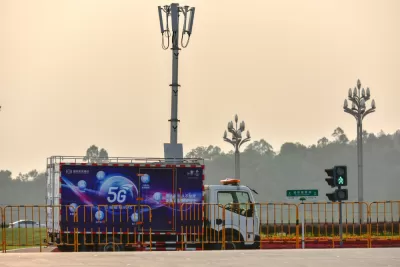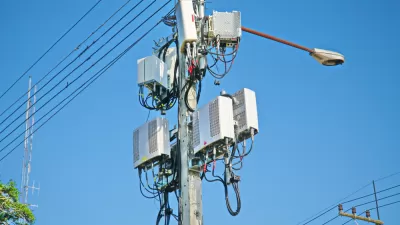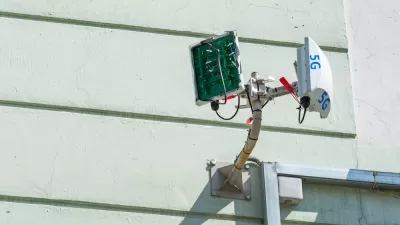The implementation of 5G Internet infrastructure raises fundamental questions about how private companies operate in the public realm. Don't expect easy answers.

The rollout of 5G Internet infrastructure is well underway all over the world, but progress is not without obstacles. Because 5G is such a pioneering technology, there are not always regulatory precedents for the questions and challenges raised by the implementation of the new technology.
Here are four of the regulatory challenges that could complicate ongoing 5G infrastructure development.
1. The Potential for Reduced Privacy Due to Enhanced Location Tracking
People already know that carrying a smartphone with location tracking turned on gives a surprising amount of details about what they do and where they go. In 2018, The New York Times published a feature article about how apps with location-tracking capabilities expose those details, and the information sometimes gets passed to advertisers.
That piece raised many potentially concerning scenarios. More recently, Steve Bellovin, a computer science professor at Columbia University, discussed how 5G and its infrastructure could decrease privacy even more.
For starters, 5G signals have shorter ranges than those associated with older networks. That means communications operators will have to erect more cellular towers. Unlike apps, smartphones detect where people are according to which cell towers they use. Today, the cell tower range is about a mile, but Bellovin says 5G towers will be closer together, making it even easier to detect a person's location.
Moreover, because 5G signals aren't very penetrative, there will be more cell towers inside buildings like shopping malls, Bellovin predicts. Bellovin also puts forth a scenario where multiple 5G-powered sensors could pick up instances of people doing certain things, such as smoking. Then, a health or life insurance company might want that data to adjust the premium price or coverage of one of its clients.
As of now, no regulations say where, when, and how communication companies or other brands can track customers through their phones. If people get increasingly concerned about the possible risks associated with 5G and location tracking, they may start demanding regulatory action.
2. Regulatory Clashes Between Telecom Operators and Locals
Even in these early stages, clashes have occurred between national telecom brands and local authorities. In one case, city officials in San Francisco won a California Supreme Court case that argued 5G infrastructure could not detract from the city's aesthetic qualities.
In Highland Ranch, Colorado, residents aren't happy about the appearance of dozens of small-cell sites in their community. Like some people in San Francisco, they don't like the way the equipment looks. But, others simply think the rollout is happening too fast, and there's no need to rush things. State and federal laws limit local authority in Highland Ranch, but the company involved in setting up the small-cell towers encountered delays due to the resistance from residents.
Such regulatory friction could cause hassles for telecom operators in the area. Plus, the decision-making bodies overseeing planning proposals and similar documents might take longer than usual to reach conclusions since 5G represents a relatively new concern.
According to statistics, the 5G network will generate $533 billion in U.S. gross domestic product (GDP) over a seven-year period. That's a good thing for the nation, but it may take longer than anticipated for some cities and towns to see the benefits of 5G if the majority of residents oppose the network or even a minority is vocal enough with its complaints.
3. Koreans Assert That Mobile Operators Aren't Ready for 5G Smartphones
Some of the other regulatory issues surrounding 5G have to do with the technology that relates to the infrastructure. In Korea, the top three mobile carriers already support a 5G smartphone made by Samsung. But, shortly after it reached the market, consumers griped about a major problem. The phone has a feature that should allow it to switch seamlessly between 5G and 4G networks so that users don't notice the shift.
But, people who own the phone said their mobile data function disconnected during the transition between networks and required numerous restarts before it worked again. Samsung updated the phone's software, and the mobile carriers improved the software for their base stations. Some users said the issue stopped after the base station updates.
One source believes the issue isn't the base stations, but that telecom operators have not properly optimized their networks to deal with the switches between the networks. If that's true, there's likely to be countless other disgruntled customers.
But, outside of phone-specific issues, the mobile telecom providers admitted other shortcomings, such as users unhappy about a lack of access in certain areas or slower-than advertised speeds. The outcries caused the South Korean government to begin holding weekly meetings between phone manufacturers and telecom networks to try and iron out the kinks.
If more, similar reports come from Korea or other places around the world, consumer protection regulators may intervene to hold mobile network operators and tech manufacturers accountable.
4. 5G Doesn't Align With Some Existing Radiation Regulations
Tight regulations on radiation halted planned 5G trials in some European countries. In Brussels, Belgium, the radiation limits are strict, although they recently loosened slightly to allow for the 5G network. Government officials are nonetheless concerned that 5G's technology doesn't enable measuring the radiation emitted from individual antennas.
One mobile operator planned to have a trial in Brussels this year and offer commercial 5G services next year. But, government minister Céline Fremault says there is no way to guarantee that the radiation output will stay within the allowable range. Trials will not proceed until that changes.
Similar issues play out in Switzerland. Members of Swiss Parliament have twice refused to relax its radiation limits to permit 5G until there's more clarity about whether potential risks exist.
So, the country's environmental agency will regularly measure 5G-related radiation and publish its findings. That decision came after government authorities said their research showed more than half the Swiss public feels concerned about the health problems the radiation might cause.
Regardless of the city or country where these radiation qualms arise, the sentiment around the matter, as well as existing regulatory restrictions on radiation, could both hinder progress.
Still Substantial Work to Do
The examples here show that although it's not hard to find instances of 5G progress, numerous obstacles exist that may require regulators to set boundaries or tweak rules that are in place. Once they do that, the respective parties working on 5G's introduction can respond accordingly.

Study: Maui’s Plan to Convert Vacation Rentals to Long-Term Housing Could Cause Nearly $1 Billion Economic Loss
The plan would reduce visitor accommodation by 25,% resulting in 1,900 jobs lost.

North Texas Transit Leaders Tout Benefits of TOD for Growing Region
At a summit focused on transit-oriented development, policymakers discussed how North Texas’ expanded light rail system can serve as a tool for economic growth.

Why Should We Subsidize Public Transportation?
Many public transit agencies face financial stress due to rising costs, declining fare revenue, and declining subsidies. Transit advocates must provide a strong business case for increasing public transit funding.

How to Make US Trains Faster
Changes to boarding platforms and a switch to electric trains could improve U.S. passenger rail service without the added cost of high-speed rail.

Columbia’s Revitalized ‘Loop’ Is a Hub for Local Entrepreneurs
A focus on small businesses is helping a commercial corridor in Columbia, Missouri thrive.

Invasive Insect Threatens Minnesota’s Ash Forests
The Emerald Ash Borer is a rapidly spreading invasive pest threatening Minnesota’s ash trees, and homeowners are encouraged to plant diverse replacement species, avoid moving ash firewood, and monitor for signs of infestation.
Urban Design for Planners 1: Software Tools
This six-course series explores essential urban design concepts using open source software and equips planners with the tools they need to participate fully in the urban design process.
Planning for Universal Design
Learn the tools for implementing Universal Design in planning regulations.
Ascent Environmental
Borough of Carlisle
Institute for Housing and Urban Development Studies (IHS)
City of Grandview
Harvard GSD Executive Education
Toledo-Lucas County Plan Commissions
Salt Lake City
NYU Wagner Graduate School of Public Service






























